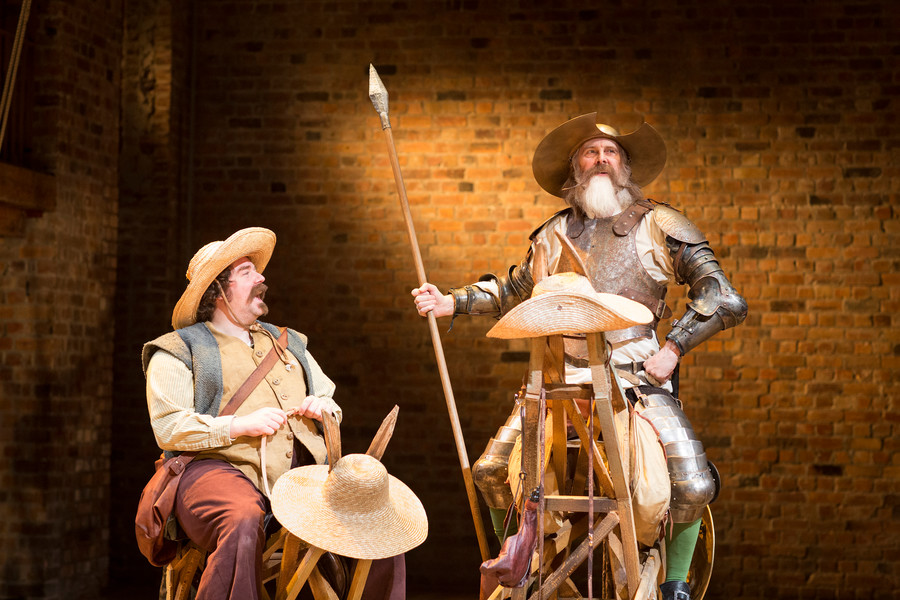
The present – whatever the truth – is always seen as a grossly lacking, cynical, depressing and ignoble era. So why not simply ignore reality, pick a supposed golden age and dream-shift into it?
That’s the plot of Cervantes’ 400 year old classic novel: Don Quixote. And at its best this stage version by James Fenton, shows why that idea continues to resonate with meaning and amusement.
The writing is sharp with nicely observed modern commentary. There are attractive Grant Olding songs with lyrics taken from Cervantes, fun puppetry, simple staging and worthy leading and support performances. But sadly, Angus Jackson’s production lacks pace, zest and unity.
The original 16th century story provides a bright start. An elderly man from Spanish minor gentry, has wasted away his life and money studying medieval chivalry. When senility takes hold, he declares himself to be a knight: Don Quixote de la Mancha, and sets off in full armour on a quest to help the helpless and vanquish the wicked.
He takes an idle farmer, Sancho Panza, as his squire, declares himself the champion of a village girl he calls the noble Lady Dulcinea, and proceeds to mistake inns for castles, sheep for armies, galley slaves for wronged prisoners and windmills for giants.
Yet a few minor beatings aside, his misplaced bravery thrives as people humour his madness, and his local priest and barber protect him from his worst excesses. A sad ending is inevitable, however, once his exploits become famous and the subject of organised and cruel teasing.
So why don’t all the elements create a joyful whole? Partly because the best of Cervantes’ mystery and ideas is reserved for the songs, which are mostly given low key performances. It’s not a musical, it’s a play with overly integral songs.
The action and mood are too unvaried, and whilst some of the puppetry is captivating – such as the creation of Panza’s tiny children, other areas of invention fail. A skeletal framework for the knight’s mount, fronted by an incongruously unmasked actor, just don’t say horse.
The accent is on – too much on – group performance but as Don Quixote, David Threlfall has a quiet authority, and a pleasing way of adapting his own absurd knight errant rules when they’re over intrusive.
As Sancho, Rufus Hound begins as bit of a jack the lad with unscripted stand-up and audience involvement. It is not sustained, however, leaving a faint air of desperation.
One wants to be picked up transported into the wild mayhem of it all, but instead there’s only a pedestrian walk through the story.
But enrapturing moments arrive sporadically, when for example the rabble in the inn rise wonderfully to the challenge of improvising an investiture ceremony for the novice knight.
The ending too finds the right note. The old man is now sane and repentant, facing the grimiest of actualities on his death bed. Yet urged on by Panza he goes out embracing the wildness of his lived out dream.
Cervantes is saying … Life can overwhelm us with boring necessity. Whatever else you do hang onto your dreams, for without them you’ll be dead before your time. ★★★☆☆ Derek Briggs 17th March 2016

